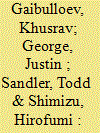|
|
|
Sort Order |
|
|
|
Items / Page
|
|
|
|
|
|
|
| Srl | Item |
| 1 |
ID:
166737


|
|
|
|
|
| Summary/Abstract |
This article investigates the demand for military expenditure for a sample of key Asia-Pacific countries. Spatial panel demand estimates are presented for three joined spatial units using a fixed-coefficient spatial lag model based on a two-step efficient GMM estimator. Spatial autoregression estimates are next presented for 1991–2015, founded on alternative kinds of country connectivities, such as contiguity, inverse distance, discrete distance, and power-projection considerations. Finally, 11 select countries’ demands for defense equations are estimated using seemingly unrelated regressions. From alternative perspectives, these estimated models indicate how Asia-Pacific countries respond to the defense spending of other countries. In the spatial runs, free riding is prevalent despite the growing military might of China, which apparently is not generally viewed as a threat. For the sample period, the projection of Chinese or American power is a relevant spatial factor. The main threat is reflected in non-U.S. allies’ reaction to U.S. allies’ defense spending during 1991–2015 and to Chinese defense spending after 2002.
|
|
|
|
|
|
|
|
|
|
|
|
|
|
|
|
| 2 |
ID:
177032


|
|
|
|
|
| Summary/Abstract |
This paper introduces transnational terrorist hostage event (TTHE) data set from 1978 to 2018. TTHE includes up to 50 variables for each of its 1,974 incidents, based on information in media sources. Four types of hostage incidents—kidnappings, barricade missions, skyjackings, and non-aerial hijackings—are recorded for a global sample. Select key variables include the number of hostages, targets of abductors’ demands, terrorist behavior in negotiations, amount of money ransom demands, other kinds of demands, duration of incident, and the outcome of negotiations. Our hostage data set also indicates location start and end, attack force size, victim numbers, casualties, weapons used, and logistical outcome. TTHE is tied to the International Terrorism: Attributes of Terrorist Events (ITERATE). We display interesting features of hostage incidents over time and an application of TTHE to identify the determinants of logistical and negotiation successes for hostage missions.
|
|
|
|
|
|
|
|
|
|
|
|
|
|
|
|
| 3 |
ID:
142040


|
|
|
|
|
| Summary/Abstract |
Based on spatial panel regressions for 1990–2012, this article draws publicness differences between peacekeeping personnel contributions to UN and non-UN peacekeeping operations. The analysis shows that UN missions are much less responsive to personnel spillovers, derived from other contributors’ peacekeepers, than is the case of non-UN missions. UN peacekeeping missions display either no response or free riding to these personnel spillovers, while non-UN missions indicate spillover complementarity. Moreover, a number of controls distinguish the two kinds of peacekeeping, where non-UN missions display income normality and UN missions’ deployments increase with the number of concurrent peacekeeping missions. The latter suggests that some countries specialize in supplying UN peacekeepers as a money-making venture. The positive response to the population variable supports this conjecture for UN missions, because a greater population base provides the recruits for peacekeeping operations. Our spatial empirical analysis accounts for the endogeneity of peacekeeper spillovers. The article concludes with a host of robustness tests that account for the alternative classes of peacekeepers, African Union and ECOWAS missions, and other empirical variants.
|
|
|
|
|
|
|
|
|
|
|
|
|
|
|
|
| 4 |
ID:
157905


|
|
|
|
|
| Summary/Abstract |
Based on a country panel from 1995 to 2013, this study examines the relationship between state failure and transnational terrorism with respect to perpetrator’s proximity to the target and logistical complexity of attacks. Using concentration curves and generalized estimating equation negative binomial models, the study shows that failed states experience significantly more transnational terrorism when the perpetrators are from the home country. But these states do not produce terrorists who cross borders and carry out attacks in other countries, neither do they attract foreign perpetrators. The latter suggests that conditions in failed states present major operational challenges to foreign terrorists. State failure also causes more logistically complex attacks due to lack of effective counterterrorism measures by failed states. The main results hold true for both relative and dichotomous measures of state failure.
|
|
|
|
|
|
|
|
|
|
|
|
|
|
|
|
|
|
|
|
|